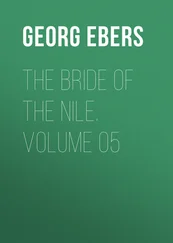Georg Ebers - The Bride of the Nile. Complete
Здесь есть возможность читать онлайн «Georg Ebers - The Bride of the Nile. Complete» — ознакомительный отрывок электронной книги совершенно бесплатно, а после прочтения отрывка купить полную версию. В некоторых случаях можно слушать аудио, скачать через торрент в формате fb2 и присутствует краткое содержание. Жанр: foreign_prose, literature_19, foreign_antique, на английском языке. Описание произведения, (предисловие) а так же отзывы посетителей доступны на портале библиотеки ЛибКат.
- Название:The Bride of the Nile. Complete
- Автор:
- Жанр:
- Год:неизвестен
- ISBN:нет данных
- Рейтинг книги:4 / 5. Голосов: 1
-
Избранное:Добавить в избранное
- Отзывы:
-
Ваша оценка:
- 80
- 1
- 2
- 3
- 4
- 5
The Bride of the Nile. Complete: краткое содержание, описание и аннотация
Предлагаем к чтению аннотацию, описание, краткое содержание или предисловие (зависит от того, что написал сам автор книги «The Bride of the Nile. Complete»). Если вы не нашли необходимую информацию о книге — напишите в комментариях, мы постараемся отыскать её.
The Bride of the Nile. Complete — читать онлайн ознакомительный отрывок
Ниже представлен текст книги, разбитый по страницам. Система сохранения места последней прочитанной страницы, позволяет с удобством читать онлайн бесплатно книгу «The Bride of the Nile. Complete», без необходимости каждый раз заново искать на чём Вы остановились. Поставьте закладку, и сможете в любой момент перейти на страницу, на которой закончили чтение.
Интервал:
Закладка:
“I do not hear Paula to-night,” he remarked, glancing up as though he missed something. “The poor child has no doubt gone to bed early after what passed.”
“Leave her alone!” said Neforis who did not like to be interrupted in her jubilant effusiveness, and she shrugged her shoulders angrily. “How she behaved herself again! We have heard a great deal too much about charity, and though I do not want to boast of my own I am very ready to exercise it—indeed, it is no more than my duty to show every kindness to a destitute relation of yours. But this girl! She tries me too far, and after all I am no more than human. I can have no pleasure in her presence; if she comes into the room I feel as though misfortune had crossed the threshold. Besides!—You never see such things; but Orion thinks of her a great deal more than is good. I only wish she had been safe out of the house!”
“Neforis!” her husband said in mild reproach; and he would have reproved her more sharply but that since he had become a slave to opium he had lost all power of asserting himself vigorously whether in small matters or great.
Ere long the Mukaukas had fallen into an uneasy sleep; but he opened his eyes more frequently than usual. He missed the light footfall overhead to which he had been accustomed for these two years past; but she who was wont to pace the floor above half the night through had not gone to rest as he supposed. After the events of the evening she had indeed retired to her room with tingling cheeks and burning eyes; but the slave-girls, who paid little attention to a guest who was no more than endured and looked on askance by their mistress, had neglected to open her window-shutters after sundown, as she had requested, and the room was oppressively sultry and airless. The wooden shutters felt hot to the touch, so did the linen sheets over the wool mattrasses. The water in her jug, and even the handkerchief she took up were warm. To an Egyptian all this would have been a matter of course; but the native of Damascus had always passed the summer in her father’s country house on the heights of Lebanon, in cool and lucent shade, and the all-pervading heat of the past day had been to her intolerable.
Outside it was pleasant now; so without much reflection she pushed open the shutter, wrapped a long, dark-hued kerchief about her head and stole down the steep steps and out through a little side door into the court-yard.
There she drew a deep breath and spread out her arms longingly, as though she would fain fly far, far from thence; but then she dropped them again and looked about her. It was not the want of fresh air alone that had brought her out; no, what she most craved for was to open her oppressed and rebellious heart to another; and here, in the servants’ quarters, there were two souls, one of which knew, understood and loved her, while the other was as devoted to her as a faithful dog, and did errands for her which were to be kept hidden from the governor’s house and its inhabitants.
The first was her nurse who had accompanied her to Egypt; the other was a freed slave, her father’s head groom, who had escorted the women with his son, a lad, giving them shelter when, after the massacre of Abyla, they had ventured out of their hiding-place, and after lurking for some time in the valley of Lebanon, had found no better issue than to fly to Egypt and put themselves under the protection of the Mukaukas, whose sister had been Paula’s father’s first wife. She herself was the child of his second marriage with a Syrian of high rank, a relation of the Emperor Heraclius, who had died, quite young, shortly after Paula’s birth.
Both these servants had been parted from her. Perpetua, the nurse, had been found useful by the governor’s wife, who soon discovered that size was particularly skilled in weaving and who had made her superintendent of the slave-girls employed at the loom; the old woman had willingly undertaken the duties though she herself was free-born, for her first point in life was to remain near her beloved foster-child. Hiram too, the groom, and his son had found their place among the Mukaukas’ household; in the first instance to take charge of the five horses from her father’s stable which had brought the fugitives to Egypt, but afterwards—for the governor was not slow to discern his skill in such matters—as a leech for all sorts of beasts, and as an adviser is purchasing horses.
Paula wanted to speak with them both, and she knew exactly where to find them; but she could not get to them without exposing herself to much that was unpleasant, for the governor’s free retainers and their friends, not to mention the guard of soldiers who, now that the gates were closed, were still sitting in parties to gossip; they would certainly not break up for some time yet, since the slaves were only now bringing out the soldiers’ supper.
The clatter in the court-yard was unceasing, for every one who was free to come out was enjoying the coolness of the night. Among them there were no slaves; these had been sent to their quarters when the gates were shut; but even in their dwellings voices were still audible.
With a beating heart Paula tried to see and hear all that came within the ken of her keen eyes and ears. The growing moon lighted up half the enclosure, the rest, so far as the shadow fell, lay in darkness. But in the middle of a large semi-circle of free servants a fire was blazing, throwing a fitful light on their brown faces; and now and again, as fresh pine-cones were thrown in, it flared up and illuminated even the darker half of the space before her. This added to her trepidation; she had to cross the court-yard, as she hoped, unseen; for innocent and natural as her proceedings were, she knew that her uncle’s wife would put a wrong construction on her nocturnal expedition.
At first Neforis had begged her husband to assist Paula in her search for her father, of whose death no one had any positive assurance. But his wife’s urgency had not been needed: the Mukaukas, of his own free will, had for a whole year done everything in his power to learn the truth as to the lost man’s end, from Christian or Moslem, till, many months since, Neforis had declared that any further exertions in the matter were mere folly, and her weak-willed husband had soon been brought to share her views and give up the search for the missing hero. He had secured for Paula, not without some personal sacrifice, much of her father’s property, had sold the landed estates to advantage, collected outstanding debts wherever it was still possible, and was anxious to lay before her a statement of what he had recovered for her. But she knew that her interests were safe in his hands and was satisfied to learn that, though she was not rich in the eyes of this Egyptian Croesus, she was possessed of a considerable fortune. When once and again she had asked for a portion of it to prosecute her search, the Mukaukas at once caused it to be paid to her; but the third time he refused, with the best intentions but quite firmly, to yield to her wishes. He said he was her Kyrios and natural guardian, and explained that it was his duty to hinder her from dissipating a fortune which she might some day find a boon or indeed indispensable, in pursuit of a phantom—for that was what this search had long since become.
[Kyrios: The woman’s legal proxy, who represented her in courts of justice. His presence gave her equal rights with a man in the eyes of the Law.]
The money she had already spent he had replaced out of his own coffers.
This, she felt, was a noble action; still she urged him again and again to grant her wish, but always in vain. He laid his hand with firm determination on the wealth in his charge and would not allow her another solidus for the sole and dearest aim of her life.
Читать дальшеИнтервал:
Закладка:
Похожие книги на «The Bride of the Nile. Complete»
Представляем Вашему вниманию похожие книги на «The Bride of the Nile. Complete» списком для выбора. Мы отобрали схожую по названию и смыслу литературу в надежде предоставить читателям больше вариантов отыскать новые, интересные, ещё непрочитанные произведения.
Обсуждение, отзывы о книге «The Bride of the Nile. Complete» и просто собственные мнения читателей. Оставьте ваши комментарии, напишите, что Вы думаете о произведении, его смысле или главных героях. Укажите что конкретно понравилось, а что нет, и почему Вы так считаете.












